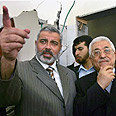
Quartet welcomes Palestinian unity government
Middle East peace mediators endorse Palestinian President Mahmoud Abbas' effort to establish national unity government with Hamas, which is still officially committed to the destruction of Israel
"The Quartet welcomes the efforts of Palestinian President Mahmoud Abbas to form a government of national unity, in the hope that the platform of such a government would reflect Quartet principles and allow for early engagement," UN Secretary-General Kofi Annan and foreign ministers of the United States, European Union and Russia said in a statement.
Abbas is trying to build a coalition of his moderate Fatah party and the Islamist Hamas movement which defeated it in elections in January. The West has boycotted the Hamas-led government formed in March because it refused to recognize Israel and renounce violence.
The use of the term "reflect" allows Abbas some leeway for what may be an oblique formula for recognizing past Palestine Liberation Organization agreements.
The statement, endorsed by US Secretary of State Condoleezza Rice, represented a significant softening of the United States' stance toward the Palestinian Authority since Hamas took it over this year and a diplomatic victory for the Europeans, UN and EU diplomats said.
U.N. Middle East peace envoy Alvaro de Soto told Reuters it would have been unthinkable three or four months ago, but "now there is the willingness to consider the possibility of a coalition government including Hamas."
Rice deflected talk of a US shift, telling reporters: "If indeed there is going to be a government which is able to govern, it is going to need the support of the international community and it needs to be committed to peace."
The statement also called for a three-month extension and expansion of a temporary mechanism that channels aid to the Palestinians bypassing the existing Hamas-led government.
The Quartet also encouraged Israel to transfer some USD 500 million in Palestinian tax and customs revenue that it is withholding to keep the money out of Hamas hands.
Former Foreign Minister Silvan Shalom said in response that “the Quartet decision constitutes a real diplomatic avalanche, which was taken behind Israel’s back.”
Shalom also said that ”The (Foreign Minister Tzipi) Livni and Abu-Mazen (Palestinian President Mahmoud Abbas) meeting gave a green light to the world to speak with Hamas, without it changing its stance for the destruction of Israel.”
Confusing signals
The Quartet indirectly criticized Israel for maintaining its closure of the Gaza Strip and restrictions on Palestinians' freedom of movement in the occupied West Bank.British Foreign Secretary Margaret Beckett said Hamas was sending mixed signals on the terms of a possible Palestinian unity government, and it was unclear where it stood.
De Soto said Abbas was trying to draw moderate and pragmatic forces in Hamas into government in hopes of reviving peace negotiations with Israel.
"What has now become starkly clear after the Lebanon war is that ultimately you are going to be blundering from crisis to crisis until you address the broad Israeli-Arab conflicts and first and foremost the Israeli-Palestinian conflict," he said.
The US-led aid embargo and a ban on contacts with the Hamas-led government has contributed to worsening poverty and lawlessness in the Palestinian territories.
European External Relations Commissioner Benita Ferrero-Waldner said she wanted to see the temporary aid mechanism expanded "as much as we can" to ease the economic hardship among Palestinians.
The Quartet also endorsed a move by Annan to revive the role of former World Bank president James Wolfensohn to report on the economic and humanitarian situation on the ground.
Wolfensohn quit in April in disagreement with the decision to cut all but humanitarian aid to the Hamas-led government.
Abbas met President Bush earlier on Wednesday. Aides said he told Bush he was trying to form a government that respected past Palestinian-Israeli agreements.
He also urged Bush to reactivate the road map peace plan, envisioning a Palestinian state alongside Israel.
US officials had previously said Washington was skeptical about the proposed unity government, reflecting Israeli concerns that the platform must contain real recognition of Israel's right to exist and a commitment to end all violence.
Attila Somfalvi contributed to the report










